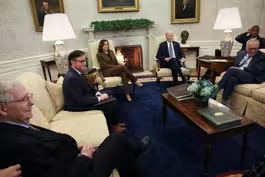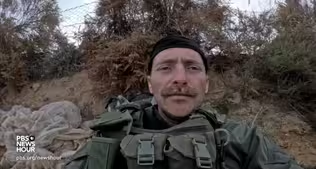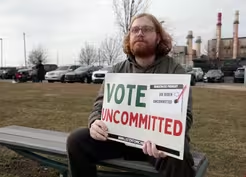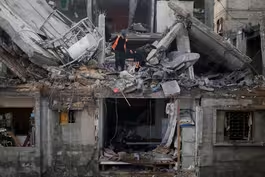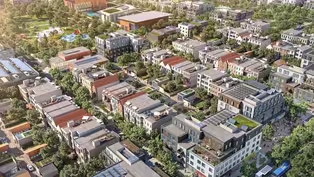
Georgia murder fuels heated debate over immigration policies
Clip: 2/27/2024 | 8m 1sVideo has Closed Captions
Murder of Georgia student fuels heated debate over immigration policies
The murder of a college student in Georgia and the immigration status of her alleged killer have thrown new fuel into the heated debate over immigration and the government's policies. Amna Nawaz discussed more with Charis Kubrin, a professor of criminology, law and society at the University of California, Irvine and co-author of, “Immigration and Crime: Taking Stock.”
Problems playing video? | Closed Captioning Feedback
Problems playing video? | Closed Captioning Feedback
Major corporate funding for the PBS News Hour is provided by BDO, BNSF, Consumer Cellular, American Cruise Lines, and Raymond James. Funding for the PBS NewsHour Weekend is provided by...

Georgia murder fuels heated debate over immigration policies
Clip: 2/27/2024 | 8m 1sVideo has Closed Captions
The murder of a college student in Georgia and the immigration status of her alleged killer have thrown new fuel into the heated debate over immigration and the government's policies. Amna Nawaz discussed more with Charis Kubrin, a professor of criminology, law and society at the University of California, Irvine and co-author of, “Immigration and Crime: Taking Stock.”
Problems playing video? | Closed Captioning Feedback
How to Watch PBS News Hour
PBS News Hour is available to stream on pbs.org and the free PBS App, available on iPhone, Apple TV, Android TV, Android smartphones, Amazon Fire TV, Amazon Fire Tablet, Roku, Samsung Smart TV, and Vizio.
Providing Support for PBS.org
Learn Moreabout PBS online sponsorshipAMNA NAWAZ: The murder of a college student in Georgia and the immigration status of her alleged killer have thrown new fuel into the heated debate over the U.S. southern border and the government's policies.
At the University of Georgia, grief hangs in the air after last week's death of 22-year-old nursing student Laken Hope Riley.
Students, including her sorority sisters, gathered yesterday to remember Riley.
CHLOE MULLIS, President, Alpha Chi Omega: She showed incredible wisdom throughout her friendships.
Many sisters have shared that she was the best listener.
She would allow you to ramble on about how your day was or how your life had been lately.
And she soaked it up intently.
Her wisdom flowed throughout all aspects of her life, and she had an eye for those who were secretly struggling.
AMNA NAWAZ: Riley's body was found in this wooded area on campus last Thursday.
Her roommate had reported her missing after she failed to return from a mourning jog; 26-year-old Venezuelan citizen Jose Antonio Ibarra was charged with her murder.
Immigration officials say, in September of 2022, Ibarra was detained in Texas after illegally entering the U.S. from Mexico, but then released for further processing.
Students returned to classes this week, but the community has been shaken to its core.
Riley's death is believed to be the school's first homicide in nearly 30 years.
BETHANY BATEMAN MCDONALD, University of Georgia: I'm a mom.
And as a mom, I couldn't imagine, I couldn't imagine something like this happening to my children.
AMNA NAWAZ: Beyond campus... JESSE WATTERS, FOX News Anchor: A dangerous foreign national broke the law and suffered no consequences because of fringe policies the far left claims are compassionate.
THOMAS HOMAN, Former Acting Director, U.S. Immigration and Customs Enforcement: This is another senseless, preventable death because of this open border.
AMNA NAWAZ: Conservatives and right-wing media link the Biden administration's immigration approach with Riley's death.
GOV.
BRIAN KEMP (R-GA): Laken's death is a direct result of failed policies on the federal level.
AMNA NAWAZ: Georgia's Republican Governor Brian Kemp pointed to record high numbers at the U.S. southern border.
GOV.
BRIAN KEMP: It is an understatement to say that this is a major crisis.
And because of the White House's failures, every state, as I have said repeatedly, is now a border state.
And Laken Riley's murder is just the latest proof of that.
AMNA NAWAZ: On social media, former President Trump said -- quote -- "Biden's border invasion is destroying our country and killing our citizens."
And he reiterated his campaign pledge to - - quote -- "seal the border and deport illegal criminals."
The White House has expressed condolences to Riley's family, but has not responded directly to the Republican accusations, all this as both Biden and Trump plan dueling border visits to Texas on Thursday of this week.
And to help with some context around these questions around immigration and crime, I'm joined now by Charis Kubrin.
She's a professor of criminology, law, and society at the University of California, Irvine, and co-author of the book "Immigration and Crime: Taking Stock."
Professor, let's begin with the obvious here.
Our thoughts are obviously with the family of Laken Riley and her friends, the senseless loss of a young woman's life.
Authorities also today just revealed her death was due to blunt-force trauma.
And the man, we know, accused here is an undocumented immigrant.
Those are all facts.
What do you make of the larger conversation around those facts right now?
CHARIS KUBRIN, University of California, Irvine: When I heard about this tragic event, my heart went out immediately.
That is, of course, the first reaction I had.
But the second one is, uh-oh, I hope that this is not used as -- this awful event is not used for political advantage.
And it appears that that is what is essentially happening.
We see a tragic event become a sparking point for really restrictive policies aimed at immigrants.
AMNA NAWAZ: So, I know in your work and in your book, you look exactly at this issue going back even to the early 1900s about the intersection of crime and immigration.
Broadly speaking, what have you learned?
CHARIS KUBRIN: So, there's been so much research that's been done on how immigration and crime are related, both among immigrants, are immigrants more or less crime-prone than their native-born counterparts, and does immigration to an area cause crime to go up or down?
And more recently, there's been an explosion of research in this area because of public perception and interest.
And what's pretty amazing is, across all this research, by and large, we find that immigrants do not engage in more crime than native-born counterparts, and immigration actually can cause crime to go down, rather than up, so quite contrary to public perception.
AMNA NAWAZ: And does any of your research examine any differences between an undocumented immigrant and those who are legally here in the United States?
CHARIS KUBRIN: Right.
That's become an increasingly important question that we have sought to answer.
There are a handful of studies that have begun to do this using pretty sophisticated estimation techniques to identify the number of undocumented individuals.
And what those studies find is, similar to the research in general, there is no criminogenic impact among undocumented immigrants.
In other words, undocumented immigrants are not engaging in more crime, contrary to public perception.
And the presence of undocumented immigrants in an area does not correlate with higher crime, particularly violence.
AMNA NAWAZ: Professor, I'm sure you have heard this argument before.
We're hearing this again, which is that if this man had not been allowed to enter into the United States, if he'd not been allowed to stay, he couldn't have committed this crime, and this young woman would still be alive today.
Are people making that argument wrong?
CHARIS KUBRIN: Well, it's not that argument's wrong, because, essentially, that is true, but I think it's misplaced, because, at the end of the day, if we really do want to cut down on crime in general, absent this one horrific incident, making restrictive, exclusionary and harsh policies aimed at immigrants is really not going to yield the benefits of reductions in crime that many people believe, largely because, as I just mentioned, immigrants are not the ones engaging in crime.
I would point out also that there's been a lot of instances of violence on campus with young individuals getting killed, tragic events, most of which are occurring by native-born Americans.
And so I think we need to pay attention to broader factors that contribute to this kind of senseless violence, rather than simply aiming our targets at immigrants.
AMNA NAWAZ: So that leap from the crime of one person catalyzing to fear of an entire group or population, we don't really see that, as you mentioned, with native-born Americans or white Americans more broadly.
Is that something unique to immigrant populations?
CHARIS KUBRIN: So that's the interesting thing.
I have never seen a headline, not once in my life, that has read native-born American has engaged in this crime or that crime.
And so what happens is most of the stories identify a person's immigrant status and link it with crime in headlines, in social media, in the news.
That essentially reinforces the public perception that both go hand in hand, when in fact the data show just the opposite.
So it's an uphill battle in terms of public perception.
AMNA NAWAZ: What should we expect to see in the months ahead?
We are in an election year.
Immigration is a top issue for voters around the country.
Do you expect this conversation to continue at this kind of heated level?
CHARIS KUBRIN: I think it will, unfortunately, for the exact reasons I mentioned early on, which is that this is an opportunity, an awful opportunity, to seize on a political advantage.
What I hope happens is that we identify places where we can improve things when it comes to immigration, but also do so in a way that makes smart policy, policy that will help things more broadly, rather than simply use a scapegoat moment to make more restrictive policies that are not going to do much in the end for crime.
AMNA NAWAZ: Professor Charis Kubrin from the University of California, Irvine, thank you so much for your time.
We appreciate it.
CHARIS KUBRIN: Thank you.
Biden, congressional leaders meet with shutdown looming
Video has Closed Captions
Clip: 2/27/2024 | 6m 9s | Biden, congressional leaders meet at White House with potential shutdown looming (6m 9s)
IDF soldier's videos offer unique perspective of war in Gaza
Video has Closed Captions
Clip: 2/27/2024 | 7m 25s | Israeli soldier's video diaries offer unique perspective on war in Gaza (7m 25s)
Michigan Democratic Party chair on 'uncommitted' voters
Video has Closed Captions
Clip: 2/27/2024 | 4m 24s | Michigan Democratic Party chair discusses 'uncommitted' primary voters (4m 24s)
News Wrap: Israel, Hamas doubt Biden's cease-fire hopes
Video has Closed Captions
Clip: 2/27/2024 | 4m 8s | News Wrap: Israel, Hamas cast doubt on Biden's hope for cease-fire deal (4m 8s)
Plan for new affordable city in California meets skepticism
Video has Closed Captions
Clip: 2/27/2024 | 8m 54s | Vision for new affordable city in California meets skepticism from locals (8m 54s)
Providing Support for PBS.org
Learn Moreabout PBS online sponsorship
- News and Public Affairs

FRONTLINE is investigative journalism that questions, explains and changes our world.

- News and Public Affairs

Amanpour and Company features conversations with leaders and decision makers.












Support for PBS provided by:
Major corporate funding for the PBS News Hour is provided by BDO, BNSF, Consumer Cellular, American Cruise Lines, and Raymond James. Funding for the PBS NewsHour Weekend is provided by...
